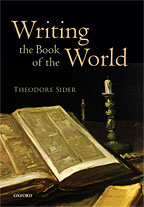Metaphysics is not just semantics, says philosopher
By Linda B. Glaser


Metaphysicians spend their days asking questions like whether chairs exist. Some critics think such questions are silly, like the question of whether the pope is a bachelor. But the two questions are not really similar, says Theodore Sider, the Frederick J. Whiton Chair in philosophy.
"We could have a fun argument about how the pope isn't a bachelor because he couldn't possibly be married, but that's not a deep question about the way the world works," says Sider. "It's just about words."
Challenging a chair's existence, on the other hand, questions the ultimate reality that underlies ordinary facts. It's generally agreed that subatomic particles are "arranged chairwise," says Sider, but does that mean there also exists something called a chair?
In Sider's new book, "Writing the Book of the World" (Oxford University Press), the Cornell philosopher argues that it's not enough for a representation of the world to be true. Descriptions of the world must also distinguish between questions about objective reality and questions that are just about our concepts of reality.
As a scientific realist, Sider believes certain concepts of physics, logic and mathematics are "perfectly fundamental," though he does not spend time trying to prove this. Rather, he uses his book to press the case that there is truly one best way to describe the world, using an objectively special language that matches reality's fundamental concepts.
In an interview, he offered an example of a representation of reality that did not use this special language: the imaginary word "cinnerjacket," meaning either a cow or a dinner jacket. A cow and a jacket, then, would be "two cinnerjackets," and while that would be true within the definition of the word, it would not be as good a match to reality's structure as calling a blue chair and a red chair "two chairs." An even better match of reality's structure would be to call an electron and an electron "two electrons."
"If you spent your whole life speaking the cinnerjacket language, and everything you said used similarly contrived concepts, you would say true things, but you'd be doing worse at describing the world than somebody who used better concepts," explains Sider. "Not because you said something false but because you're picking up on features of reality that are just not important."
The 336-page book is intended for scholars and advanced students of metaphysics.
Sider joined the College of Arts and Sciences faculty this past fall in a dual hire with his wife, associate professor Jill North, who specializes in the philosophy of physics. Sider credits her with helping him work out some of the finer points of quantum mechanics.
Linda B. Glaser is staff writer for the College of Arts and Sciences.
Media Contact
Get Cornell news delivered right to your inbox.
Subscribe